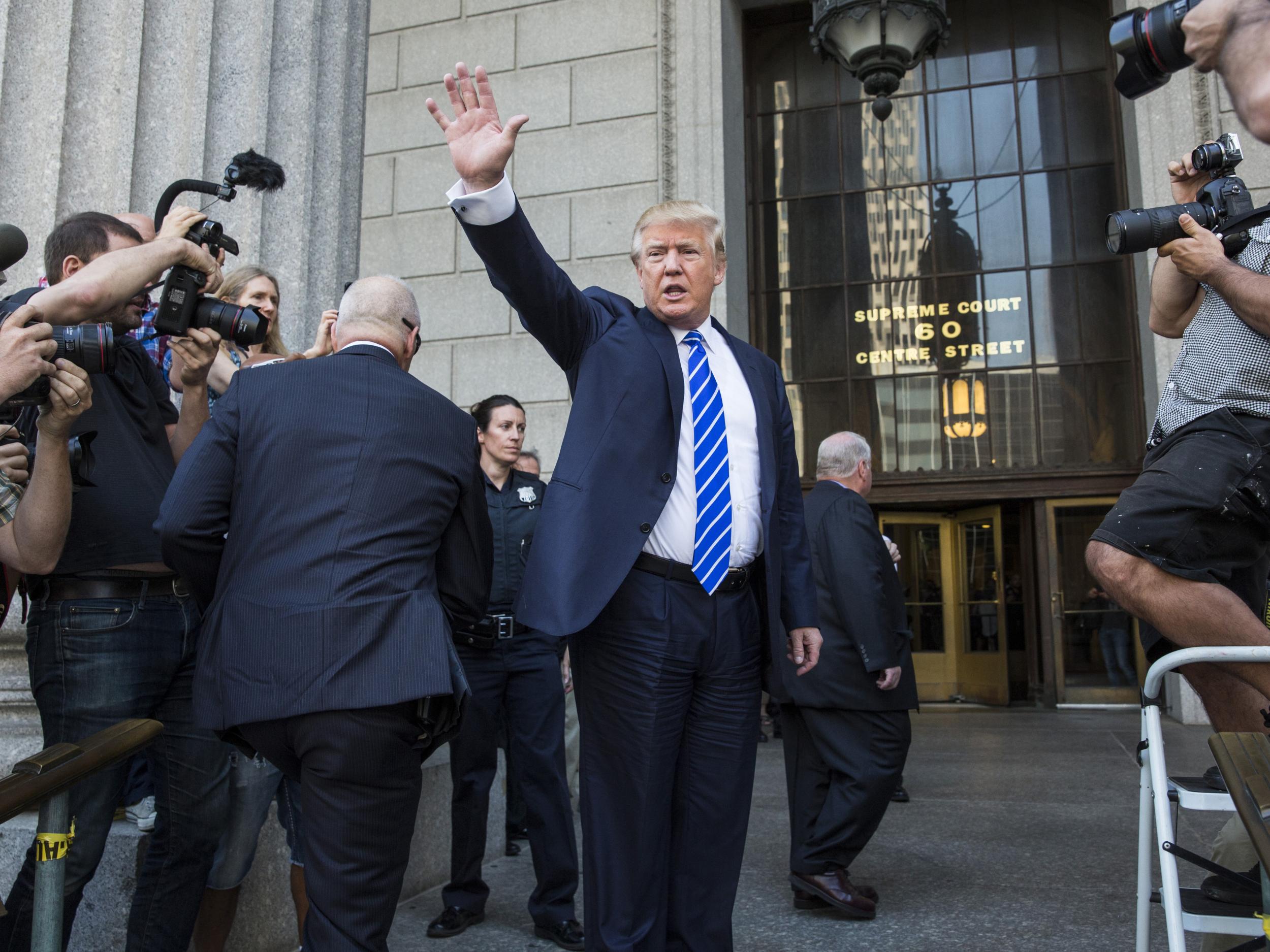US lawyers 'too scared' to publish report on Donald Trump baselessly suing people – in case he baselessly sues them
Organisation accused of 'sponsoring a group of lawyers to study free speech and at the same time censoring their free speech'

Your support helps us to tell the story
From reproductive rights to climate change to Big Tech, The Independent is on the ground when the story is developing. Whether it's investigating the financials of Elon Musk's pro-Trump PAC or producing our latest documentary, 'The A Word', which shines a light on the American women fighting for reproductive rights, we know how important it is to parse out the facts from the messaging.
At such a critical moment in US history, we need reporters on the ground. Your donation allows us to keep sending journalists to speak to both sides of the story.
The Independent is trusted by Americans across the entire political spectrum. And unlike many other quality news outlets, we choose not to lock Americans out of our reporting and analysis with paywalls. We believe quality journalism should be available to everyone, paid for by those who can afford it.
Your support makes all the difference.The American Bar Association (ABA) commissioned a report into Donald Trump baselessly suing people before refusing to publish it because they were afraid he would sue them, lawyers who worked on the document have claimed.
The report into Mr Trump’s litigation history, by a committee of media law experts, concluded he was a “libel bully” who had filed many meritless suits attacking his opponents, but had never won in court.
Instead of releasing the report, the organisation asked for changes to the title and tried to eliminate the conclusion that was "the point of the report", researchers told The New York Times.
In internal communications seen by the US newspaper — which has itself been threatened with legal action by the Republican presidential candidate — the organisation cited “the risk of the ABA being sued by Mr Trump” as a reason to make changes.
ABA leaders did not appear to dispute the actual conclusions of the report, but objected to some of the language used, including the key term "libel bully".
On 19 October, James Dimos, the association's deputy executive director, said in an email that changes were needed to address “the legitimately held views of ABA staff who are charged with managing the reputational and financial risk to the association”.
According to The New York Times he said: “While we do not believe that such a lawsuit has merit, it is certainly reasonable to attempt to reduce such a likelihood by removing inflammatory language that is unnecessary to further the article’s thesis.
“Honestly, it is the same advice members of the forum would provide to their own clients.”
Charles Tobin, a former chairman of the media-law committee, suggested the ABA's stance was hypocritical.
“It’s colossally inappropriate for the ABA to sponsor a group of lawyers to study free speech issues and at the same time censor their free speech,” he said.
ABA spokeswoman Carol Stevens denied that fear of a libel suit had played any role in the association's objections. She told The New York Times the ABA had only minor and routine objections to the article’s tone because the ABA was strictly non partisan — the report did not adhere to this policy.
“We thought it was an insightful article, and we asked them to consider minor edits,” she said.
But the media law committee said this was not accurate.
The article was titled: “Donald J Trump Is a Libel Bully but Also a Libel Loser”. The bar association proposed making a significant change and calling it: “Presidential Election Demonstrates Need for Anti-Slapp Laws," The New York Times reported
SLAPP stands for Strategic Lawsuits Against Public Participation. In states with Anti-Slapp laws defendants can sometimes seek early dismissal of libel and similar suits, and recover their legal fees.
The media-law committee decided to bypass the ABA and on Friday, the Media Law Resource Centre, a trade association of law firms and media companies, published the report on its site.
Susan Seager, a former journalist and lawyer who has worked extensively on free speech cases, prepared the report. She said she did not think any of the claims made were libellous.
“It’s based on court records, all of it,” Ms Seager told The New York Times.
She found seven free speech-related lawsuits filed by Mr Trump and his companies. They included ones against an architecture critic and his newspaper; a book author and his publisher; a political commentator; a former student at Trump University; two labor unions; a network executive; and a beauty contest contestant.
The report concluded that Mr. Trump had lost four suits, withdrawn two and obtained one default judgment in a private arbitration when a former Miss Pennsylvania failed to appear to contest the matter.
“Donald J. Trump is a libel bully,” the report concluded.
“Like most bullies, he’s also a loser, to borrow from Trump’s vocabulary.”
The bar association sought to remove that conclusion, which Ms. Seager said was the point of her report.
“I wanted to alert media lawyers that a lot of these threats are very hollow,” she said.
On Saturday, Mr Trump caused outrage by threatening to sue the women who have accused him of sexual misconduct. He also threatened to sue The New York Times for publishing their allegations, as well as his his tax returns.
Ms Seager said the bar association’s behaviour showed that Mr Trump’s threats work.
“The ABA took out every word that was slightly critical of Donald Trump,” she said.
“It proved my point.”
Join our commenting forum
Join thought-provoking conversations, follow other Independent readers and see their replies
Comments